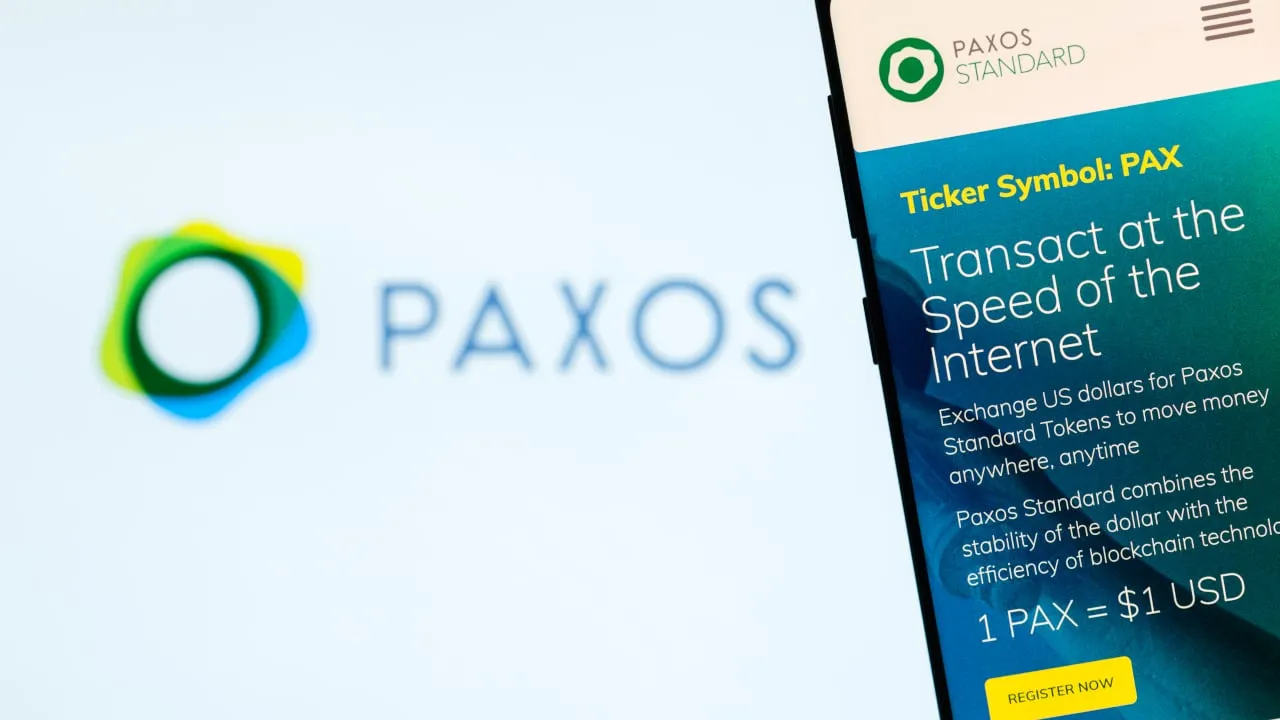“Paxos prevails in SEC investigation of BUSD stablecoin” 👏
On Tuesday, we received a formal termination notice from the SEC stating that it will not recommend enforcement action against Paxos Trust Company in the investigation of Binance USD (BUSD).
View the letter and our… pic.twitter.com/8kjysfsPg3
— Paxos (@Paxos) July 11, 2024
Coin Prices
BTC
$67,360.00
-0.96%ETH
$1,982.84
-0.06%XRP
$1.47
0.95%BNB
$615.01
-1.18%USDC
$0.999933
0.00%SOL
$83.09
-2.22%TRX
$0.279685
-0.33%DOGE
$0.100057
-0.12%FIGR_HELOC
$1.031
1.38%BCH
$558.76
-0.86%WBT
$51.30
-0.12%ADA
$0.281712
-0.23%USDS
$0.998783
-0.04%LEO
$8.47
-2.52%HYPE
$29.30
-0.79%CC
$0.166926
2.37%USDE
$0.998996
-0.04%XMR
$338.24
2.98%LINK
$8.76
-0.67%XLM
$0.165552
-0.32%USD1
$0.999663
-0.01%RAIN
$0.00986391
-1.10%ZEC
$282.29
-2.58%HBAR
$0.100694
0.44%LTC
$53.97
-1.53%PYUSD
$0.999578
-0.02%AVAX
$9.04
-1.42%SHIB
$0.00000644
-1.49%SUI
$0.956489
-1.73%TON
$1.44
1.40%WLFI
$0.123131
22.72%CRO
$0.079208
-0.44%M
$1.49
-1.31%XAUT
$4,939.79
0.91%PAXG
$4,962.45
0.84%UNI
$3.54
-0.20%DOT
$1.34
-1.63%MNT
$0.629605
-1.52%AAVE
$126.68
-0.18%BUIDL
$1.00
0.00%TAO
$190.06
-0.52%PEPE
$0.00000433
-2.13%USDF
$0.997047
-0.14%ASTER
$0.707205
-0.08%PI
$0.186325
4.30%OKB
$78.93
-1.35%BGB
$2.35
-0.79%USDG
$0.999701
-0.01%USYC
$1.12
0.00%HTX
$0.0000017
-0.44%SKY
$0.066709
-2.75%RLUSD
$0.999821
0.02%ETC
$8.62
-0.94%NEAR
$1.037
-2.08%ONDO
$0.271935
-1.12%BFUSD
$0.998766
-0.03%ICP
$2.33
-2.33%USTB
$10.99
0.01%PUMP
$0.00208916
-4.54%HASH
$0.02043517
20.02%POL
$0.109748
3.14%ATOM
$2.32
1.85%GT
$7.13
-1.95%KCS
$8.42
1.11%WLD
$0.387611
-2.01%QNT
$69.06
-0.10%NIGHT
$0.059835
7.35%ENA
$0.118426
-1.35%NEXO
$0.871091
-4.08%KAS
$0.03195802
0.42%USDTB
$0.999713
0.05%ALGO
$0.092667
-1.69%MORPHO
$1.49
6.22%FLR
$0.00961856
0.55%TRUMP
$3.50
2.16%EUTBL
$1.24
0.11%RENDER
$1.45
0.13%XDC
$0.03675891
-0.83%JAAA
$1.027
0.00%FIL
$0.954697
-1.67%OUSG
$114.32
0.03%USDD
$0.99951
0.00%APT
$0.901597
-3.40%USDY
$1.11
0.22%VET
$0.00800911
-1.32%ARB
$0.11136
-1.93%BDX
$0.080238
-0.12%PIPPIN
$0.575121
-0.46%USD0
$0.995992
-0.15%JTRSY
$1.095
0.00%BONK
$0.00000643
-1.32%USDAI
$0.999894
0.02%STABLE
$0.02948635
-1.38%GHO
$1.00
0.00%JUP
$0.16238
-1.73%A7A5
$0.01297032
0.31%SEI
$0.074198
-0.51%TUSD
$0.997709
-0.02%FTN
$1.09
0.22%DASH
$37.15
-1.31%STX
$0.259086
-0.89%EURC
$1.18
0.18%PENGU
$0.00703244
-1.26%CAKE
$1.30
-0.88%XTZ
$0.393639
-0.63%VIRTUAL
$0.642916
-0.25%KITE
$0.233546
13.83%CHZ
$0.04024557
-0.66%IP
$1.13
-2.29%DCR
$22.86
-1.37%FDUSD
$0.998613
-0.05%OP
$0.185183
-1.43%LIT
$1.56
-1.25%FET
$0.170106
-0.73%KAU
$159.13
-0.25%JST
$0.04272246
-0.16%CRV
$0.251299
-0.64%CTM
$0.084095
0.04%ETHFI
$0.474329
-1.55%NFT
$0.00000034
-1.56%BTT
$0.00000034
0.16%BSV
$16.76
-0.15%KAIA
$0.056802
-1.50%H
$0.179823
-8.87%SUN
$0.01701776
-2.92%SPX
$0.348788
7.73%USX
$0.999752
0.02%PYTH
$0.056042
-0.13%GNO
$121.49
-6.09%ZRO
$1.54
-5.39%INJ
$3.09
-1.29%PRIME
$1.02
0.00%FLOKI
$0.00003158
-1.02%TIA
$0.33923
-0.65%IOTA
$0.068639
-1.67%GRT
$0.02743468
-1.59%JASMY
$0.00593154
-3.78%ADI
$3.01
0.45%AERO
$0.316974
0.03%CRVUSD
$0.995361
-0.32%LDO
$0.338141
-1.05%SYRUP
$0.245662
-0.45%HNT
$1.49
7.84%CFX
$0.053909
-0.41%FRAX
$0.988259
-0.32%OHM
$17.35
0.75%2Z
$0.077
-1.18%ENS
$6.86
2.56%TEL
$0.00275101
0.33%STRK
$0.04790706
-1.18%MYX
$1.34
-10.14%AB
$0.00256274
1.24%ZK
$0.02161159
-0.78%BTSE
$1.51
0.94%TWT
$0.557767
-0.47%SAND
$0.086335
0.79%WIF
$0.228428
-3.03%MON
$0.02101602
-4.87%NUSD
$1.00
0.19%AXS
$1.34
-1.64%ULTIMA
$5,958.71
3.84%YLDS
$0.999964
-0.00%USTBL
$1.075
0.01%USDA
$0.983816
-0.42%AUSD
$0.999691
0.00%BCAP
$22.86
2.65%XPL
$0.09597
-2.18%ZBCN
$0.00209581
2.50%AWE
$0.103294
11.09%PENDLE
$1.22
0.03%THETA
$0.200539
-3.16%APEPE
$0.00000095
-1.31%NEO
$2.78
-1.05%XCN
$0.00526442
-2.61%MANA
$0.100617
-0.24%FARTCOIN
$0.193225
-0.09%CVX
$2.08
5.85%BAT
$0.127205
-1.33%FF
$0.081326
1.71%PC0000031
$1.00
0.00%GALA
$0.00399891
-1.87%VSN
$0.052146
-0.76%LUNC
$0.00003414
0.00%BORG
$0.189244
-0.58%IUSD
$1.001
0.03%VVV
$4.17
2.08%S
$0.04800182
0.01%UDS
$1.45
-2.41%GLM
$0.179395
-2.94%FDIT
$1.00
0.00%RAY
$0.659521
-2.81%COMP
$18.29
-5.77%WFI
$2.20
-0.08%FLUID
$2.24
-1.97%RIVER
$8.83
-25.76%BARD
$0.761377
-5.25%SIREN
$0.235614
9.47%MWC
$15.22
-8.98%REAL
$0.05329
-0.18%MX
$1.80
-0.20%SENT
$0.02262066
2.79%KOGE
$47.97
-0.01%XEC
$0.0000081
-1.59%THBILL
$1.015
0.31%EURS
$1.27
0.15%USDF
$0.998071
0.04%SATUSD
$0.972519
-2.18%TRAC
$0.335506
1.84%GUSD
$0.99879
0.07%USR
$0.99952
0.12%CUSD
$0.974012
-2.67%QRL
$1.83
6.73%WEMIX
$0.309698
-0.12%IMX
$0.166776
-1.01%RUNE
$0.399017
-1.25%0G
$0.653284
-1.77%A
$0.084955
-0.41%SFP
$0.274404
1.00%ZANO
$9.02
1.03%B
$0.136084
-2.96%JTO
$0.310251
-9.54%EGLD
$4.61
-1.57%BERA
$0.627616
-7.33%WAL
$0.083327
-2.63%TIBBIR
$0.133522
8.13%1INCH
$0.094316
-1.07%GOMINING
$0.32349
-0.24%AR
$2.02
-0.02%KTA
$0.264869
0.02%AMP
$0.00153986
-1.02%ACRED
$1,097.91
0.08%LION
$0.00416894
-0.06%RLB
$0.073244
-6.31%BMX
$0.37238
-3.44%DOLA
$0.994473
-0.06%OZO
$0.130672
-0.10%EIGEN
$0.206258
-2.17%MF-ONE
$1.058
0.04%LPT
$2.43
-2.73%BEAM
$0.00234698
-2.63%PUSD
$1.001
0.00%SKR
$0.02106388
-0.89%COW
$0.210718
-0.69%MELANIA
$0.124105
3.42%BAN
$0.117495
18.97%COCO
$0.115955
1.77%KMNO
$0.02890903
-9.55%APE
$0.125189
-2.28%
